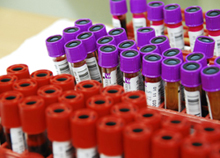
A study by scientists at the Emory Vaccine Center, in collaboration with the biotechnology company Atreca, Inc., has found that antibodies generated from the blood of survivors of Ebola virus disease can strongly neutralize the Ebola virus in the laboratory and protect mice from a lethal viral challenge.
The research was presented at the annual Grand Challenges Meeting of the Bill and Melinda Gates Foundation in London on Oct. 26, 2016. The Gates Foundation provided funding for the Atreca antibody research and the Defense Advanced Research Projects Agency (DARPA) provided funding for the studies led by Emory. Carl Davis, MD, PhD, a research fellow in the laboratory of Emory Vaccine Director Rafi Ahmed, and Guy Cavet, PhD, senior vice president and chief technology officer at Atreca, presented the research.
Emory University Hospital treated four patients with Ebola virus disease in Fall of 2014 and, with the patients’ permission, collected samples of their blood for further research.
Using Atreca’s Immune Repertoire Capture™ (IRC™) technology and methods previously described in the Ahmed lab, the research team was able to isolate antibodies from the blood of the survivors. These antibodies were evaluated by a DARPA-funded consortium that included teams at the Aaron Diamond Aids Research Center, the Centers for Disease Control and Prevention (CDC), the Scripps Research Institute, Stanford University, the University of Wisconsin School of Veterinary Medicine, and the U.S. Army Medical Research Institute of Infectious Diseases (USAMRIID).
"This collaborative research has allowed us to broaden our understanding of the Ebola virus, as well as related viruses such as Marburg virus," says Ahmed. "We have learned a great deal about how the human immune system can develop effective antibodies against the Ebola virus and which parts of the virus may be most vulnerable to the immune response. The identification of neutralizing antibodies that can protect against a viral challenge from so few patients so quickly is also a very exciting outcome, offering the potential for further research that we hope can lead to both therapeutic agents and vaccines against a rapidly evolving Ebola virus."
